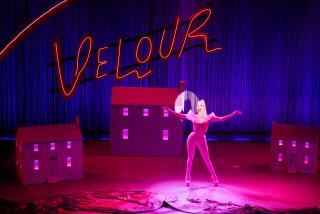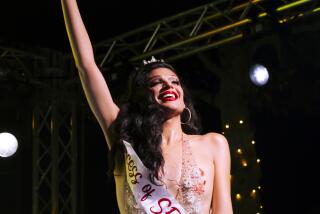Not Your Average Long-Lost Secret Twin Brother : Wickedly clever ‘Drag Queen’ zips along like a ‘Twilight Zone’ version of the ‘Patty Duke Show’ : DRAG QUEEN, <i> By Robert Rodi (Dutton: $21.95; 259 pp.)</i>
- Share via
Whatever your position on the moral values being instilled in the American public by movies and television talk shows, you’ve got to hand it to the media. Human behavior that was considered really shocking 10 years ago now seems almost commonplace. Take the wildly amusing and wickedly clever novel “Drag Queen” by Robert Rodi, which chronicles the unbuttoning of buttoned-down Mitchell Sayer, a Guppy (gay urban professional) Chicago real estate lawyer.
Completely accepted as a gay man by his colleagues and family (and the reader), Mitchell has few problems larger than the fact that his Chinese antique rug is out of line with his teak floorboards. Enter his gaunt, Escada-clad mother Bettina, who, having failed to find inner peace through veganism, Esperanto and aromatherapy, has decided to sell her substantial worldly possessions and join a Tibetan convent. Eager to begin her new life according to Dharma, she reveals a closely held secret: Mitchell is adopted--both his biological parents died in a freak badminton accident--and what’s more, he has an identical twin brother.
Fueled by the hope that his twin will be his soul mate, he hires a detective to track him down. Within 24 hours he learns that his long-lost brother, Donald Sweet, also lives in Chicago and is working as a hand model. Never much for spontaneity, Mitchell carefully dissects a pear in “perfectly identical sections,” whips up linguine al pesto with steamed brocco-flower for dinner, reads the new Harper’s and finally musters the nerve to call.
Donald has known for years that he had a twin but refrained from looking for him out of sheer terror. “What if you turned out to be this macho version of me who was good at baseball and football and all those other balls? And who liked the Rolling Stones and Bruce Springsteen . . . and who knew all about car engines?” he explains. Still, Donald agrees to a meeting and suggests that they rendezvous at the Tam-Tam Club, where he moonlights as a nightclub singer.
“Mitchell envisioned him as being a witty, worldly Noel Coward type in a smoking jacket and bow tie, singing patter song and French ballads, debonair and irresistible.” When instead he encounters Donald’s alter ego, the flamboyantly wigged, gowned, stiletto-heeled, carmine-taloned drag queen Miss Kitten Kaboodle, he flips into control-freak meltdown. The reader, conditioned by “The Crying Game,” “Priscilla, Queen of the Desert,” “To Wong Foo, Thanks for Everything, Julie Newmar” and countless episodes of Oprah Winfrey, will not be nearly as taken aback.
Also not surprising is that Mitchell and Kitten react to each other like one of those cloudburst-producing conditions of warm tropical air and Arctic blasts. It is practically a law of the sitcom universe that the over-the-top Kitten will cause trouble at the law firm, Mitchell will try to reform her and sooner or later, being identical twins, they will switch places.
But the reader’s expectations merely heighten the suspense, and the plot zips merrily along like a “Twilight Zone” version of the old “Patty Duke Show.” Rather than going to the sock hop, these twins go to the leathermen convention, the drag queen musical revue and the gay pride parade.
Their world is populated by singularly eccentric characters who come to life thanks to the author’s bitchy prose. Among the most memorable are Mitchell’s best friend and former lover, Simon, “a former International Mr. Leather finalist who wore black boots and a leather cap even with cutoffs in July,” and Zoe Briggs, the conniving legal associate with the “razor-sharp, Dorothy-Hamill-from-hell hairdo” whom the lawyers in Mitchell’s firm have dubbed “the partner hag.”
Such is the author’s skill and obvious affection for his characters that they come across as real people, and you genuinely care for them. I actually shuddered when Mitchell had unsafe sex--repeatedly!--at an orgy. (In fact, this was the only thing in the book that truly stunned me.)
Perhaps the secret to the book’s universal appeal lies in the dialogue, which remains honest and down to earth, no matter how outlandish the situation. For instance, Mitchell and Donald, reluctantly dressed as a man for a change, are having a drink together when Mitchell confesses that he doesn’t get why his brother wants to be a drag queen.
“What’s not to understand?” Donald replies. “Look at me! I’m just this ordinary nothing of a man. Someone you’d never look at twice if you saw him in the street. A big gray absence of a person.”
“Hey,” Mitchell protests. “Those are my looks you’re dissing.”
Donald ignores him. “Now, why would I want to be this way,” he continues, “when I can put on a little makeup, a wig and some attitude, and become this showstopper? This attention-grabber? Someone who walks into a room and brings that room to a standstill?”
Even the most conservative reader will get the urge to slip into a spangled frock and belt out Judy Garland.
More to Read
Sign up for our Book Club newsletter
Get the latest news, events and more from the Los Angeles Times Book Club, and help us get L.A. reading and talking.
You may occasionally receive promotional content from the Los Angeles Times.










